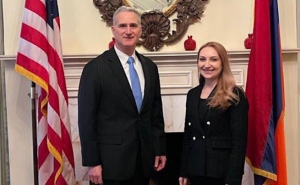Pentagon to Get Its Fourth Leader in Six Months

Navy Secretary Richard Spencer is preparing to become the U.S. Defense Department’s fourth leader in just six months, at a time when some experts say the United States can ill afford another acting defense secretary, foreignpolicy reports.
Spencer, a former Marine aviator and career businessman, is expected to assume one of the most prominent cabinet secretary positions on a temporary basis in coming weeks while U.S. President Donald Trump’s latest nominee, Mark Esper, enters the confirmation process—and at an especially tumultuous time. The U.S. military came within minutes of a conflict with Iran in June, after Tehran shot down a surveillance drone over the Strait of Hormuz. Meanwhile, the administration is trying to shore up additional support from allies in Syria amid the possible resurgence of the Islamic State. Washington is also locked in a kind of cold war with Beijing, as China continues island building and other provocative behavior in the South China Sea.
Within the department, 20 of the Pentagon’s top jobs are vacant or held by temporary or acting officials. Most recently, Adm. William Moran, who was set to become the Navy’s top military officer, resigned due to a probe into his relationship with a former officer accused of sexual harassment.
Former Defense Secretary Ash Carter, in remarks on Tuesday, warned of the perils of going too long without a confirmed defense secretary. While he said he has confidence that the Pentagon will “hold together,” it can’t move forward on key initiatives, such as improving recruitment or investing in the right technology, without a permanent leader.
“It’s a competitive world out there: the Chinese, the Russians, the Iranians, the North Koreans, terrorists. To stay the best, you have to have a really competitive streak,” Carter said at the Council on Foreign Relations in Washington. “Only the secretary and the top leadership can move people forward.”
Spencer’s ascension to the top Pentagon job is the result of chaos at the most senior levels of the department and a little-known U.S. statute governing the department’s line of succession. Trump’s first defense secretary, James Mattis, resigned in December over the president’s decision, since partially reversed, to pull out of Syria; his chosen successor, Patrick Shanahan, spent five months as acting secretary before withdrawing his name from consideration for the permanent job after disturbing reports emerged about his family history. Trump announced Shanahan’s resignation and his decision to appoint Esper, then serving as the Army secretary, as the new acting defense secretary via Twitter in June.
Under the Federal Vacancies Reform Act, once the Senate formally receives Trump’s nomination of Esper to lead the Pentagon, the former Raytheon executive must step aside while lawmakers consider his appointment, said Eric Chewning, the Defense Department’s chief of staff, during a Tuesday briefing at the Pentagon.
As the most senior, Senate-confirmed official in the line of succession—neither of the officials performing the duties of the deputy defense secretary or Army secretary are confirmed—Spencer will then take over as acting defense secretary.
Chewning said he expects the Senate to move quickly to confirm Esper. But a major challenge, even for a confirmed defense secretary, is getting the famously volatile president to listen to advice, Carter said.
“I didn’t have to deal with that, and none of my predecessors did,” Carter said.
In preparation both for the confirmation process and to take on the new role, Spencer has spent the last two weeks receiving operational and administrative briefings from the Joint Chiefs of Staff and the Office of the Secretary of Defense, Chewning said.
“The planning ensures there is one person in charge of the Department of Defense with the authorities necessary to protect our homeland and to defend America’s interests around the world,” Chewning said.
As he is going through the confirmation process, Esper will revert back to his previous role as Army secretary, going so far as to physically move offices, Chewning noted. Meanwhile, Ryan McCarthy, who is currently performing the duties of the Army secretary, will also revert back to his previous role as Army undersecretary.
David Norquist, the Pentagon’s comptroller who is currently performing the duties of the deputy defense secretary, will remain in his role until the Senate officially receives his nomination to become permanent deputy.
The rest of the secretary’s team—including the chairman of the Joint Chiefs of Staff, Gen. Joseph Dunford, and Chewning himself—will stay in place.
Again due to the Vacancies Act, Esper cannot serve in an acting capacity past July 30, when the 210-day clock that began when Mattis departed on Jan. 1 expires. However, that clock will be “on pause” once Esper is formally nominated, Chewning said.
-
 17:08
17:08The regular session of the Anti-corruption Policy Council takes place in Jermuk
-
 15:05
15:05The Prime Minister sends congratulatory messages to the supreme leader of Iran and the President of Iran
-
 11:11
11:11Armenia sends earthquake aid to Turkey
-
 10:43
10:43Commemoration of the Pontiff St. Sahak Partev
-
 09:16
09:16Some roads are closed and difficult to pass in Armenia
-
 19:55
19:55Phone conversation of the Foreign Minister of Armenia with the U.S. Assistant Secretary of State for European and Eurasian Affairs
-
 18:30
18:30Prime Minister Pashinyan and President Khachaturyan meet
-
 18:20
18:20Ararat Mirzoyan with Co-Chairman of the OSCE Minsk Group of France Brice Roquefeuil
-
 17:01
17:01Humans could land on Mars within 10 years, Musk predicts
-
 16:45
16:45France, US urge 'immediate' end to Nagorno Karabakh blockade
-
 16:01
16:01Blockaded Nagorno Karabakh launches fundraiser to support quake-hit Syria
-
 15:59
15:59Earthquake death toll in Turkey rises to 18,342
-
 15:43
15:43Ararat Mirzoyan Held a Telephone Conversation with Sergey Lavrov
-
 15:06
15:06French president rules out fighter jet supplies to Ukraine in near future
-
 14:47
14:475 Day Weather Forecast in Armenia
-
 14:44
14:44President Vahagn Khachaturyan wrote a note in the book of condolences opened in the Embassy of Syria in Armenia
-
 14:20
14:20Azerbaijan’s provocations impede establishment of peace and stability – Armenian FM tells Russian Co-Chair of OSCE MG
-
 12:57
12:57France representation to OSCE: Paris calls on Azerbaijan to restore freedom of movement through Lachin corridor
-
 11:40
11:40Command of Kosovo forces highly appreciated preparation of Armenian peacekeepers
-
 10:16
10:16The United States withdrew from sanctions against Syria for six months the provision of assistance after the earthquake
day
week
month
Humidity: %
Wind: km/h









